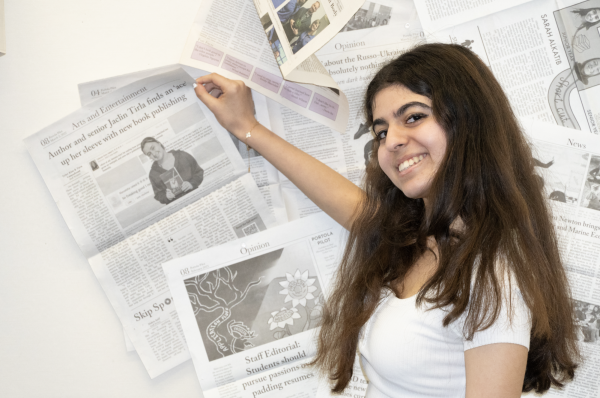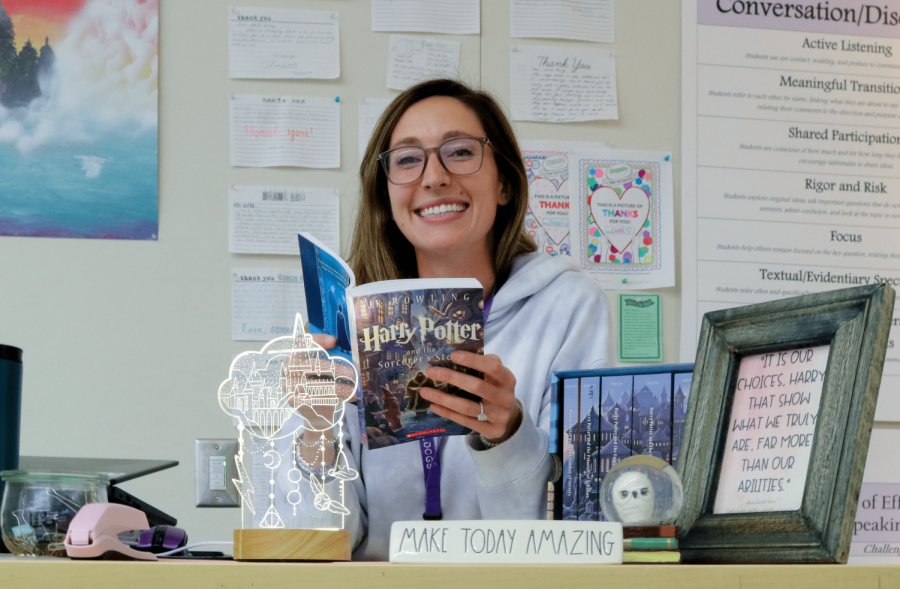For this Teacher, ‘Harry Potter’ Really is the Chosen Series
Literary and language arts teacher Kate Avery is all smiles as she makes it to her favorite part of “Harry Potter & the Sorcerer’s Stone” during one of her annual re-reads. Accompanying her on her desk is an assorted set of Harry Potter-related items: a snow globe of a snowy owl resembling Harry’s pet owl Hedwig, a framed photo of Avery’s favorite quote from the Harry Potter series and a lamp depicting various symbols featured prominently in the novels. While Avery no longer buys licensed ‘Harry Potter’ merchandise, she enjoys having more subtle nods to the series adorning her classroom.
*This article contains spoilers for the “Harry Potter” book and film series
Harry Potter: One of the most renowned fictional characters and one of the most popular book series of all time, adding seemingly nonsense words such as “Quidditch” to the general lexicon, producing big-budget films and even birthing a personality test that rivals astrology.
The iconic book series has an especially special home nestled in the heart of literary and language arts teacher and Ravenclaw Kate Avery.
“Even though it was a kids’ series, it helped me understand grief and loss and, honestly, imposter syndrome,” Avery said. “How many times does Harry feel like, ‘I don’t want to be the chosen one? Why?’ and then finally, he accepts it in the seventh [book], and when he does, it’s this reassuring moment for him. It helped me understand things that are conceptually hard to understand.”
Avery first finished the series in graduate school, and since then she has made it a priority to re-read the series at least once a year, interpreting new connections each subsequent reading and starting to relate more to the adult characters of the books as she began teaching.
“I started to rationalize how [Remus Lupin] reacts very calmly to getting fired or being asked to step down. That’s really difficult to do,” Avery said. “I think before, I was like, why didn’t he put up more of a fight? Why didn’t he get in front of the narrative and say something? But now, as a teacher, I get why he did that: because it was for Dumbledore and Hogwarts.”
As a massive fan of the series, Avery also developed her own set of opinions about Hogwarts. Her favorite class? History of Magic. Her favorite spell? Levicorpus, the levitating spell. Her favorite movie? The Alfonso Cuarón-helmed “Harry Potter and the Prisoner of Azkaban.”
But Avery’s favorite book in the series, the penultimate “Harry Potter and the Half-Blood Prince,” is the most emotionally impactful, as it features Dumbledore’s death.
“That’s the death that I think had the biggest impact on [Harry’s] life,” Avery said. “It was someone that Harry finally felt could be there for him, and then he’s ripped away so brutally.”
This emotional attachment to the series eventually sparked Avery’s decision to go on excursions inspired by the real-world locales featured in the films. She visited one of the bridges the Hogwarts Express travels on, as well as a library that helped serve as inspiration for the Great Hall on a summer trip to Scotland a few years ago.
However, most discussions of “Harry Potter” spark the hotly-contested topic of the author, J.K. Rowling. Rowling’s controversial stance on transgender women, which surfaced in summer 2020, led to the “Harry Potter” author being “cancelled” on numerous social media platforms and her losing many fans, including Avery.
“I don’t buy anything branded ‘Harry Potter’ anymore,” Avery said. “I don’t want to give [Rowling] any more money.”
While she said she completely disagrees with Rowling’s controversial opinions, Avery believes the situation can easily be reframed as an opportunity to view the “Harry Potter” series through a critical lens.
“I don’t think it’s easy or even necessary to get rid of a story that will continue to transcend time. I think this is one of those prospects that will forever be positive,” Avery said. “I am not of the belief that because an author did something, people shouldn’t read their work —I actually think that would open the door to having a conversation about it.”
As an avid reader, Avery has even built up a collection of assorted versions of the books, reinforcing her status as a true Potterhead.
“I’ve got the original covers [from the 1990s],” Avery said. “I keep them at home because I don’t want to ruin them here, but the reason I think those are really special is that you can feel the pages are older, and you can start to get that smell that sort of covers it, too.”
In Avery’s reading nook, all was well.
Your donation will support the student journalists of Portola High School. Your contribution will allow us to purchase equipment and cover our annual website hosting costs.

Tara Vatandoust is an Editor-in-Chief for her third, and sadly, final year on the Portola Pilot. This year, she is looking forward to (finally!) being...




